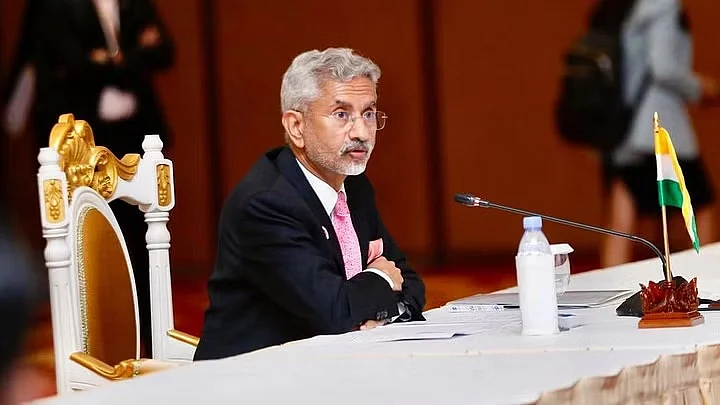The growing Chinese inroads in South Asia have pushed India’s relations with its neighbours to new lows. South Asia has regained new focus and attention under Xi Jinping and his Belt and Road Initiative (BRI).
China has been keen to improve and upgrade its relations with all of India’s neighbours and this has continued to test India’s diplomatic acumen and adaptability. This has also raised new challenges to the idea of Indian centrality and South Asia being its natural sphere of influence.
To begin with, the history of China’s relations with Pakistan is well known. Islamabad continues to be strongly aligned with Beijing while testing New Delhi’s security and diplomatic maturity.
However, a new challenge comes from the Maldives. Since the presidential election of Mohamed Muizzu under the major campaign slogan of “India Out,” the relationship has continued to worsen.
Today, the Maldives is no longer the most coveted holiday destination for Indians but has become the new foothold for China in the Indian Ocean region and President Muizzu has continued to play an important role in this. His visit to China in January 2024 resulted in the signing of 20 key cooperations while focussing on tourism and a proposal to start direct flights. This coupled with the announcement of the visit of a Chinese ‘spy’ vessel Xiang Yang Hong 03, to the Maldives which is expected to reach on 8 February 2024, has further complicated the relationship.
Though Male has asserted that the vessel will not conduct any research in Maldivian waters, and it just scheduled a halt, it has raised concerns within India. The Indian navy has expressed its concerns and surprisingly after this announcement, the Maldives' Foreign Ministry website became inaccessible for Indians. The situation appears to have reached a point of no return, at least under the Muizzu government. With each passing day, the relationship seems to be reaching a new low.
The Maldives appears to be a replay of the Sri Lankan experience. The closeness of Colombo to Beijing has complicated India’s relations with Sri Lanka.
The Sri Lankan government under Mahinda Rajapaksa welcomed Chinese investments and, in the process, alienated New Delhi. Colombo joined the BRI in 2017. However, it is known that the lure of investment and infrastructure resulted in Sri Lanka sinking under the burden of Chinese debt and leasing Hambantota port to China for 99 years. The debt trap in which Sri Lanka is stuck has destabilised its domestic economy as well as politics.
The debt-ridden state is Beijing’s strong foothold in the Indian Ocean region and Chinese vessels have continued to dock there. However, keeping Indian sentiments in mind, Colombo has announced a yearlong moratorium for Chinese ships but this does not dampen the reality of Chinese presence on the island state.
On the other hand, the Chinese influence has consistently been on the rise in Nepal as well. Kathmandu had signed the BRI in 2017 with several projects already underway. Nepalese Prime Minister Pushpa Kamal Dahal Prachanda undertook a visit to China in September 2023 during which several joint border infrastructure projects were signed and he reasserted his support for the BRI.
In the last few years, India and Nepal have witnessed worsening relations and this has greatly benefitted Beijing. China has promised several large-scale infrastructure projects and even announced the recruitment of Gorkhas to the People’s Liberation Army. This coupled with the introduction of Mandarin in Nepalese schools, media outlets and hotels owned by the Chinese and massive infrastructure projects like dams, railways roads etc., underscores the penetration of China in Nepal. As per reports China had even announced 15 billion dollars in aid to Nepal in 2022.
Another challenge for India comes from China’s relations with Bangladesh.
Dhaka joined the BRI in 2016 and since then the investments have hit an upward trajectory. From 2018 to 2021 the Chinese aid flowing to Bangladesh rose from 994 million dollars to 3.4 billion dollars. Chinese investments in Bangladesh today amount to 10 billion dollars under BRI and several critical infrastructure projects have seen fruition. All this occurred under Sheikh Hasina’s tenure, and to no surprise, she won the fourth consecutive term in January 2024. The pace of Chinese investments will only increase now and India is worried that Beijing may gain important access to the Siliguri Corridor under the garb of infrastructure development.
The only saving grace for New Delhi seems to be Thimphu. However, here again, the increasing push by China to resolve the border issue and the rising bilateral visits can become a cause of concern. Economic growth is essential for Bhutan and Beijing seems to be ultra keen to extend support.
It’s a grim picture for India, and as of today, Pakistan, Bangladesh, Sri Lanka, Nepal and the Maldives, all seem to be designing new tests for the Indian diplomatic acumen, and New Delhi is consistently left to play catch up to Chinese South Asian aspirations.
It would not be wrong to conclude that New Delhi cannot match the Chinese deep pockets and will have to look for a new direction to counter the Chinese presence. South Asia is concretely the new battleground for influence between India and China. The Chinese investments have proved to be attractive for the smaller neighbours of India and this is proving to be a tough challenge for New Delhi to mitigate.
(Dr Gunjan Singh is an Assistant Professor at Jindal Law School, OP Jindal Global University. Her research interests are in the fields of Chinese Foreign Policy, China-South Asia Relations, Domestic Politics in China, Chinese Media, Mainland-Taiwan Relations and Space Security. This is an opinion piece and the views expressed are the author’s own. The Quint neither endorses nor is responsible for them.)
